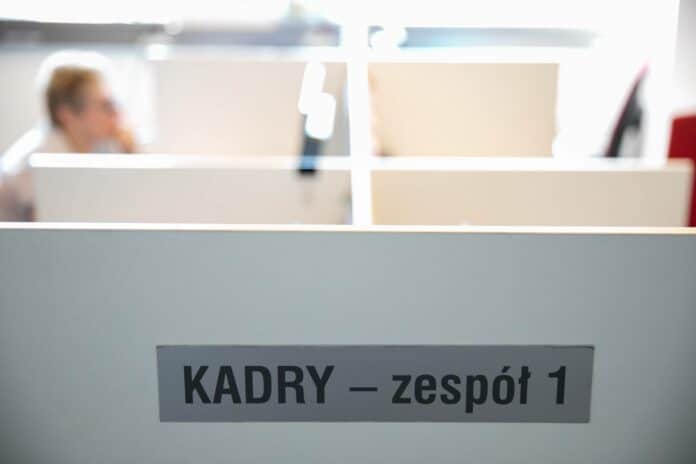The production, logistics, warehousing, trade, and transport sectors are attracting the most interest among candidates from Asia and Africa who choose Poland as their destination for economic migration. The majority of applications come from men – who make up nearly 76 percent of temporary workers currently earning in Poland and originating from these continents. There are significantly fewer women (24 percent). This is according to a report by the Progres Group, which states that 25 percent of companies in Poland plan to employ foreigners from distant destinations next year.
Over the past 10 years, the number of work permits issued to foreigners has increased tenfold – from 35,416 positive decisions to 365,490 permits in 2022 (according to data from the Public Employment Services Portal). This increase is partly due to the growing openness of domestic employers, who are increasingly willing to employ foreigners, even though they had not previously considered such a solution. The whole process is time-consuming – formalities can take up to 6 months, but once they are sorted, foreigners coming to Poland from other continents do not waste time – they work temporarily on average about 31 percent more hours than Poles. As revealed by a study of the Progres Group, candidates from distant locations (Asia and Africa), asked about their job location preferences, most often indicate the warehouse sector (47.8 percent), production (44.6 percent), trade (28.3 percent), transport, specifically drivers’ positions (25 percent), and logistics (23.9 percent).
“The personnel reality on the labor market in 2023 looks different than just a few years ago. Demographic changes and the current situation in Ukraine – an ongoing war for almost two years – is affecting the availability of workers, who largely fueled production, trade, warehouses, or the entire TSL sector. There are fewer of them on the market, and the demand for candidates is still high. We are therefore facing a new stage, a natural element of which is the search for workers in countries further away than Ukraine, e.g. in African countries or Asian countries such as India, the Philippines, Bangladesh, Sri Lanka, or Nepal. There are plenty of volunteers. Poland is perceived as a safe country and a good place to work and live, chosen by people from Africa and Asia planning a wage trip,” says Natalia Myskova, director of international recruitment at the Progres Group.
They often start with temporary work. The most of these positions are occupied by people between the ages of 25 and 34 (50.8 percent), the second place belongs to 18–24-year-olds (26.3 percent). Candidates from the 35–44 age group (16.4 percent), and individuals aged 45 to 54 (3.1 percent) are less likely to decide on relocation and a long journey for earning purposes. It is mainly men who come to Poland – 75.8 percent of temporary workers, with significantly fewer women – 24.1 percent, which is due to the high demand for male candidates and the type of work that dominates when it comes to vacant positions. These are often positions requiring physical strength and dedicated to men. The culture prevailing in India, Bangladesh, Nepal, Indonesia, or African countries, and the division of domestic duties – usually run by a woman staying in place as the man leaves to earn a living for the family – is also a barrier influencing the lower number of women coming to Poland. Among the expectations that candidates list are: accommodation near the company provided by the employer and a salary in the range of 3500-4000 PLN net. To receive it, they are ready to work even 240 hours within the Basic Workload Period. Eventually, their earnings are higher. According to data from the Central Statistical Office, the average monthly salary in the enterprise sector in 2023 is PLN 7360.20 gross (January-October 2023). In the industries where foreigners from distant locations most often and willingly take up work, this average is slightly lower: transport and warehouse economy – 7116.93 PLN gross, industrial processing – 6920.63 PLN gross, trade – 6796.13 PLN gross.
Foreigners will take up deficit jobs
Candidates from distant locations usually have appropriate qualifications and professional experience, which coincide with the needs of the Polish labor market, and there are many of them. According to the Occupation Barometer data, the list of deficit occupations in 2024 will include more than 30 professions, including truck drivers, warehouse workers, welders, locksmiths, electricians, electromechanics, and operators of cutting machines. According to the Progres Group report, these are professions gladly chosen by candidates from other continents. What’s more, Polish employers are increasingly opting for staff from a distant location – 25 percent of respondents plan to employ a foreigner from outside Europe in 2024. Currently, the list of industries where foreigners from Asia and Africa most often temporarily work includes: industry, production, logistics, warehouses, trade, and services.
“Even though entrepreneurs approach employing people from exotic destinations with great caution, their doubts fade away very quickly when they start working in Poland. Over time, they are appreciated for their conscientiousness, commitment, and qualifications”, emphasizes Natalia Myskova, director of international recruitment at the Progres Group. “Most arrivals have professional experience gained in their home country, most often in industries dominant in their country. In the case of residents of Bangladesh and the Philippines, this is the textile, electronic, automotive, or transport industry. Nepal, whose economy is mainly based on services, from where 52.6 percent of GDP comes, is a good direction for companies looking for candidates with such professional experience. From Sri Lanka to Poland, people previously employed in trade, tourism, telecommunications, or the processing industry are happy to relocate. The pandemic has caused huge financial problems in this country, which has led to a growing number of people seeking work abroad, also in Poland.”, adds Natalia Myskova.
Usually, such a trip to work in our country lasts from 3 to 4 years. In the case of temporary work – very often chosen by foreigners from distant destinations – the average employment duration is from 10 to 18 months. After this time, many people are employed directly by the company in which they have so far performed duties assigned by the agency. They spend much more time on this activity than Poles employed temporarily. On average, our compatriots work 168 hours within the Basic Workload Period per month, and arrivals from Asia or Africa work 52 hours more – 220 hours within the Basic Workload Period per month. Their commitment to the tasks entrusted to them is becoming more and more visible and appreciated by Polish entrepreneurs.
All formalities – depending on the direction – last from 3 to 6 months. The entire process of recruitment and employment is not only time consuming, but also entails costs that must be incurred, e.g. a type A permit – PLN 100, or the shipment and preparation of additional documents necessary for legal stay and work – from 300 to 500 PLN, which the employer covers. The employer also covers the cost of accommodating the employee – approx. 600 PLN per month, receiving the employee from the airport and transferring them to the accommodation site – from 150 to 250 PLN, or financing the transportation to work if it is located more than 3 km away from the accommodation. The employee incurs the cost of buying a plane ticket to Poland as well as the costs associated with obtaining a visa in their home country.
Usually, in addition to the necessary visa, a foreigner entering the territory of the Republic of Poland must justify the purpose and conditions of their stay and possesses and present on request a document confirming health insurance or the possession of travel medical insurance for a minimum coverage amount of 30,000 euros. They will also need to have both financial resources sufficient to cover the costs of the planned stay and the return journey to the home country or residence location, or a document confirming the possibility of obtaining such funds in accordance with the law. The total amount should be 75 PLN for each day of planned stay if the planned stay exceeds 4 days – or the equivalent amount in foreign currency. Additionally, if the foreigner does not have a return ticket, when crossing the border to enter Poland, they must have financial resources amounting to the value of the ticket, based on which they arrived on the territory of the Republic of Poland, but no less than 2,500 PLN, if they came from a distant location, i.e. a country that is not a member of the European Union – or the equivalent of that amount in foreign currency.


















